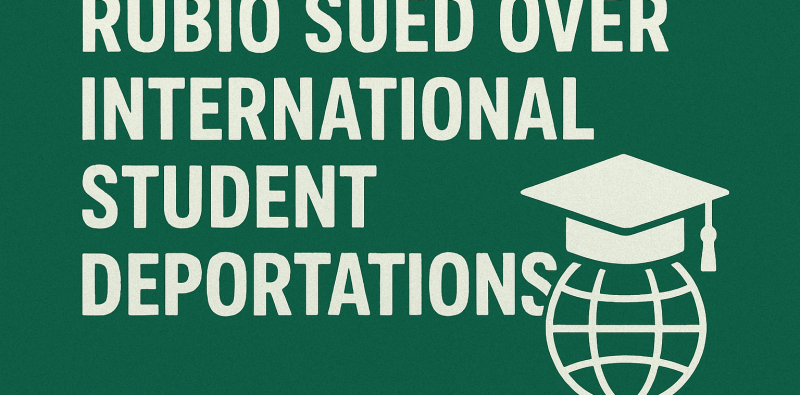
In a bold challenge to U.S. policy, a lawsuit was filed on August 6, 2025, against Secretary of State Marco Rubio, accusing him of unconstitutionally deporting international students based on their exercise of free speech. Brought forward by the Liberty Advocacy Network (LAN), a non-partisan organization dedicated to civil rights, the case seeks to affirm that the First Amendment protects all individuals on U.S. soil, regardless of citizenship status.
A Fight for Fundamental Rights
The legal action centers on the experiences of two international students, Ahmed Nasser and Leyla Demir, who faced deportation threats due to their political expressions. Nasser, a graduate student at NYU, was detained for two months after immigration officials targeted him for organizing a peaceful rally supporting Palestinian rights. Similarly, Demir, a Tufts University undergraduate, was held for over five weeks following her publication of an article urging her university to address human rights concerns. LAN attorney Sarah Mitchell declared, “No one in America should live in fear of expressing their views, whether they’re a citizen or a visitor. Free speech is a universal right, not a conditional privilege.”
The lawsuit argues that Rubio’s reliance on provisions within the Immigration and Nationality Act to target these students violates constitutional protections. One provision allows the Secretary of State to deem a noncitizen deportable if their “expressed views or affiliations” are seen as conflicting with U.S. foreign policy interests. Another grants discretionary power to revoke visas at any time. LAN contends that applying these rules to punish protected speech undermines the First Amendment’s guarantee against government retaliation based on unpopular opinions.
A Climate of Fear on Campuses
The fallout from these actions has cast a shadow over U.S. academic communities. This spring, thousands of international students saw their visas revoked after Rubio’s public warning: “We issue visas for education, not to fuel campus unrest.” Although a court later ruled the mass revocations unlawful, restoring many students’ statuses, the damage was done. Fears of detention prompted some to leave the country, while others remain wary. New data suggests a potential 30-40% drop in international enrollment this fall, exacerbated by a recent pause in visa interviews.
At Stanford University, the independent student newspaper, The Daily Voice, has felt the impact. Editor-in-Chief Rachel Nguyen reported, “Reporters are hesitant to cover sensitive topics, with some withdrawing articles or leaving the staff altogether, fearing deportation linked to their work. We’re losing diverse perspectives that enrich our reporting.” This chilling effect extends beyond journalism, affecting classrooms and research collaborations across the nation.
Legal and Ethical Questions
LAN’s complaint highlights the disparity in treatment between citizens and noncitizens, arguing it contradicts America’s commitment to equality. “Two people holding the same sign at a protest should face the same legal standing, whether one is a visa holder or a native-born resident,” said LAN legal director James Holloway. “The First Amendment doesn’t bend for immigration status—it protects everyone’s voice.”
The lawsuit comes as the State Department intensifies social media screenings, effective June 2025, to identify applicants with ties to “terrorism support” or “anti-Semitic activities.” Critics argue this vague criteria amplifies the risk of arbitrary enforcement, further eroding trust among international students. Holloway added, “In a free society, individuals shouldn’t need to present their papers to exercise their right to speak.”
Broader Implications
This legal battle unfolds against a backdrop of declining international interest in U.S. education, with global study platforms reporting a 35% drop in applications since early 2025. The case could set a precedent, determining whether noncitizens enjoy the same speech protections as citizens—a question that resonates beyond academia into the heart of American democracy. As the suit progresses, it challenges the administration to reconcile security measures with the nation’s founding principles, testing the resilience of free expression in an increasingly polarized world.
